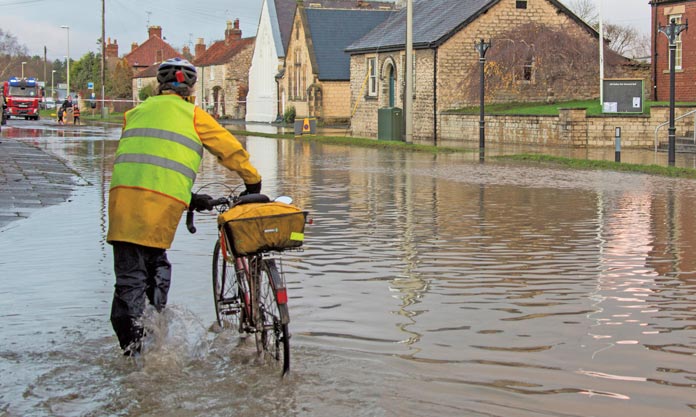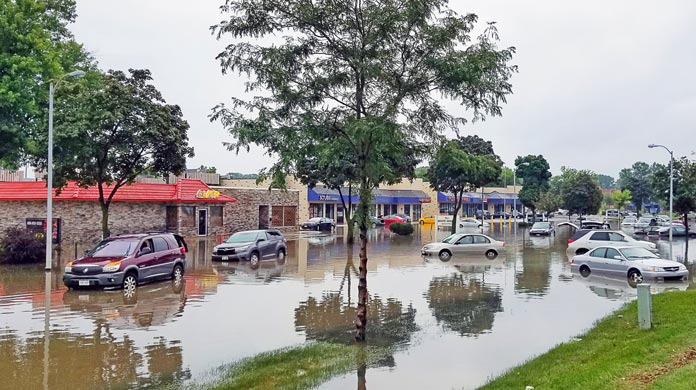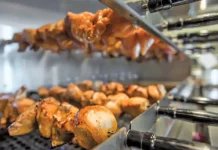
From flood waters, property damage, power loss and spoiled food, coping with the aftermath of a powerful storm could be very troublesome for restaurant owners. Therefore, during the Atlantic Hurricane season, which officially runs from June through November 30, hospitality business owners and managers must take a multi-pronged approach to safety. First, crisis communications, management and business continuity planning and then back up efforts with the proper insurance coverage.
2020 set a new record with 22 separate billion-dollar weather and climate disasters1. After the record-breaking Atlantic hurricane season last year, it appears likely that 2021 is in for the sixth consecutive above-average year. First predictions have been released, and the message is straightforward: the 2021 Atlantic Hurricane Season, which officially goes into effect in June and runs through November, will be dangerous and very active. With a quite concerning notice that also an above-average probability of hurricane landfalls along the US coastline2.
While restaurants, hotels and other businesses in the hospitality industry have no control over the weather, taking the proper steps before a hurricane can lessen the impact. Generally speaking, the three main goals of any disaster management plan are to manage the business during the crisis, resume normal operations as quickly as possible, and recover losses when it is over. By taking these goals into account when surveying the most critical areas of the business, companies can determine what steps they need to take to be fully prepared for hurricane season and beyond.
As mentioned above, having a crisis communications, management and business continuity plan in place will help ensure employee stability in the workplace. Pre-determined employee notification channels will be critical to disseminating information should the need arise. Business owners and managers should have employee contact information at their fingertips, while also establishing a toll-free hotline number or social media site that can facilitate communication during a storm.

Similarly, understanding individual risk is key to necessary business continuity planning. Try isolating the business risk first. Is it wind, power outage or hurricane damage? Will your business be down for a week, a day or a month? Review your business assets and make sure the operations that are most critical have built-in redundancy or are covered by insurance.
Coverage for When it Strikes
Losses are not always completely avoidable. Even businesses with the proper plans in place can suffer a setback from a storm. Unfortunately, according to the Munich Re NatCatService, as little as 28% of the $5,200 billion economic losses from Natural Catastrophes were insured over the period 1980-2019, due to gaps in coverage for a multitude of reasons3.
It’s important to examine your insurance policies (and any potential gaps in coverage) in advance with your professional advisor as there are a variety of policies to help coastal and non-coastal businesses recover from an event – each involving a different aspect of the restoration. It’s important to realize that all businesses in hurricane zones are at risk no matter where they are located.
- Business income coverage. Review your business income coverage limits, which include loss of income as a result of an event, to ensure they are sufficient. Extra expense coverage often accompanies business income coverage for necessary costs, such as having to relocate your business operations to a temporary location as a result of storm related damage.
- Go through a potential business interruption to determine the estimated monthly costs for both loss of income and extra expenses. How long will it take you to get your business up and running again? How much can you afford to lose? Base insurance coverage needs on identified risks to ensure that any business interruption will be covered to the greatest extent possible.
- Flood coverage. It’s important to understand that most business property policies exclude flood coverage. In addition, businesses typically buy minimum flood coverage limits, but don’t consider that floods can come from even minor storms or no storm at all.
- Examine deductibles. What type of deductible do you have on property coverage – a percentage or flat deductible? A calendar year or occurrence deductible? If your business has a lot of locations, occurrence or percentage deductibles could potentially be more costly. Additionally, many policies will have lower deductibles for wind and hail events than for a named storm.
A Hard Market
At this time, the insurance market is very turbulent with rate increases seen across the board. Insurance carriers are being much more strict when it comes to inspections and recommendations. Cancellation notices are being issued if the insured is not implementing the recommended action items and it would be a massive challenge to find cost-effective quotes if a business has to remarket mid-term.
So what can you do? In partnership with your insurance advisor, demonstrate to the marketplace why they should want your business:
- Proactive on safety to reduce potential for claims;
- Proactive on contractual risk transfer;
- Demonstrate property upgrades where possible, i.e., roof, electrical, plumbing, etc.;
- Implement outstanding recommendations from previous insurance carrier inspections;
- If not able to implement, be able to demonstrate and clearly explain the rationale for not doing so;
- When implementing risk control measures, first consideration should be given to improvements that have the greatest influence on loss severity;
- Regarding past losses, be prepared to explain corrective actions taken to prevent similar losses in the future.
Hurricanes can pose a major challenge for the hospitality industry. By taking the appropriate steps ahead of time and working with the proper experts, hospitality companies can help to ensure that they can weather any storm. Review your policy with an experienced insurance advisor now to ensure that you have the coverages and policy limits that you need to be adequately protected before a storm strikes.
Visit HUB’s dedicated Hurricane Resource Center for timely 2021 season updates and preparedness resources.
1. https://www.severe-weather.eu/tropical-weather/
2. https://coast.noaa.gov/states/fast-facts/hurricane-costs.html
3. https://www.munichre.com/en/solutions/for-industry-clients/natcatservice.html























